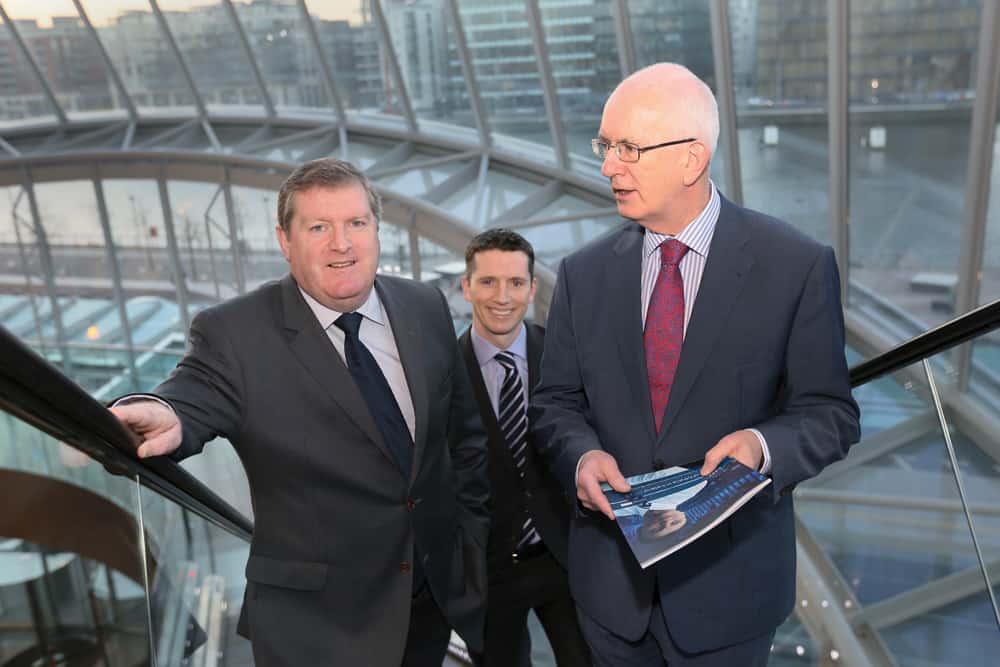Terry Browne, country manager, Danske Bank, Dr Simon Boucher, CEO, Irish Management Institute and Barry O’Leary, CEO, IDA Ireland at the launch of the IMI/Danske Bank Survey of multinationals.
CEOs and senior managers are showing increased positivity for future growth and employment in multinational firms.
The Irish Management Institute/Danske Bank Survey of Multinational Corporations (MNCs) in Ireland for 2013, was published in early November and showed increased positivity with regard to future employment and growth across the majority of multinationals operating in Ireland.
Over one third of CEOs and senior managers within the surveyed firms said they expect to increase employment in the next year, while 43% anticipate a higher turnover.
Areas of concern raised in the survey included the cost base of operations here and skills shortages. Costs of energy, labour, transport and telecommunications are comparatively high with costs continuing to rise for most firms this year. Skills shortages have impeded growth plans for 57% of firms and areas most affected by skills shortages include engineering, software and IT.
On the other hand, skills and expertise were significant factors enabling one third of Irish subsidiaries to increase their mandate. In fact, the Irish operation is the strategic centre in over half of foreign owned firms.
Survey highlights included:
- 35% of firms expect employment to increase and 43% expect turnover to increase.
- 57% specified some difficulty finding the right skills, particularly in the fields of engineering, software, language and technical skills.
- Approximately one third of foreign owned firms had a change in mandate in the past two years. A variety of key factors enabling this change included skills and expertise (25%) and the Irish tax regime (13%).
- There is increasing confidence in Ireland’s long-term economic stability, with 69% this year’s survey respondents viewing it as moderate and 16% as strong.
- Over half of respondents say they purchase essential product related supplies from local SMEs while almost half engage professional services and third party vendors from local SMEs.
Commenting at the survey launch, IDA Ireland CEO, Barry O’Leary said: “MNCs are quite optimistic about growth prospects for the coming year with one third of firms expecting employment levels to increase. A key objective of IDA’s strategy ‘Horizon 2020’ is to work with multinational companies to help future proof their businesses. A major part of future proofing any business is through transformation, including putting in place strong research, development and innovation programmes.”
He added: “It is also encouraging to note that over half of the foreign-owned firms surveyed regard the Irish operation as a strategic centre for their international business, this includes two thirds of all US-owned firms. Strategically important operations tend to embed themselves in the local economy, providing well paid and sustainable employment.’’
Value-added activities
Dr Simon Boucher, CEO of the IMI said: “A highly skilled workforce is essential to attract and retain higher value-added activities. With 57% of respondents specifying some difficulty finding the right skills, there is a clear need for practical action to close the gap between the worlds of education and work. The Government is undoubtedly making progress in tackling the mismatch between education and the labour market through initiatives such as reform of the maths syllabus and the ‘Action Plan for Jobs’, but I strongly believe Irish educational institutions can work more directly with industry to significantly develop workforce capability and ultimately company performance.”
Ambitious targets
Terry Browne, country manager, Danske Bank, said: “As an international bank operating in Ireland, Danske Bank fully appreciates the importance of both foreign direct investment to this country and the success of our indigenous multinational companies abroad. The content of this survey is helpful in the context of the critical work the Government and its agencies, including the IDA, are doing in attracting and supporting investment into Ireland. The positive sentiment and outlook apparent in the survey fits well with our ambitions in Ireland to focus our business towards corporate clients where our international reach and cross border technology platform fit perfectly with their international banking needs.”
Ireland’s reputation is improving considerably with overseas clients and operations over the past year. 41% of respondents feel the country’s reputation has improved and this marks an increase of 10% from the 2011 survey findings. 27% of respondents stated that Ireland’s improved reputation has had a positive effect on business.
Pro-growth initiatives
According to Owen Callan, senior analyst at Danske Bank Markets and co-author of the report: “2013 marks the final year that the Irish government is forced to conduct their fiscal planning under the direct supervision of the EU and IMF with the three years under their stewardship finally coming to an end. This period has seen Ireland’s economy largely repaired, and reputation significantly improved on, from the position we found ourselves in 2010.
“The 2014 Budget, though still tough in nature, was the first budget since the crisis began to show signs of a lessening of austerity by an Irish Government, when compared to previous pledges made to the Troika. While this loosening of the purse strings was relatively modest, the budget enacted by Minister for Finance Michael Noonan TD did offer some encouraging pro-business and pro-growth initiatives. It also managed to avoid too many anti-growth taxation measures.”

